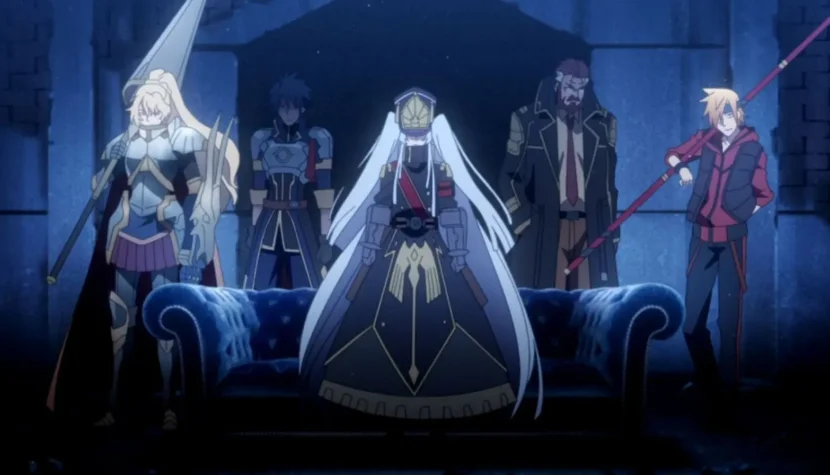RE:CREATORS. A Thought-Provoking Anime with Elements of Science Fiction and Fantasy

We’ve seen this story dozens of times before. A fantastical world and our mundane daily life intersect, their inhabitants travel through portals, and a mysterious doomsday plan looms over everything. Titles like The Lord of the Rings, The Beastmaster 2, and Masters of the Universe all come to mind, with the word “master” nearly always appearing in the title. However, Re:Creators is not just a flashy rehash of a concept introduced way back in 1666 by Margaret Cavendish, Duchess of Newcastle, in The Blazing World. Its creators have achieved a truly original vision.
The anime, where characters from fictional anime, manga, and video games come face-to-face with their creators, is a bold and thrilling idea from the first minutes—but only if you’ve already seen countless anime classics, from Dragon Ball to Neon Genesis Evangelion. Much like Wes Craven’s Scream, only a strong grounding in the genre’s canon can reveal the full depth of the story. Without this background, the characters in Re:Creators would simply appear as a collection of stereotypes common in Japanese animation for years: a mecha pilot, a sugary-sweet girl, a warrior embodying the lines of The Song of Roland, an aloof heartthrob, and so forth. However, there’s no pandering here to a less discerning audience.

After breaking free from the narrative structures that governed their lives, the heroes undergo intense personal evolution, with each mind breaking away from the dependency on the minds that created them. This leads to two factions—fierce opponents of their “gods” and those who become their allies. This powerful plot device opens up a range of moral questions. Episode three is especially noteworthy, where we meet Mamika, a typical representative of the mahō-shōjo (magical girl) genre, like Sailor Moon. In her everyday life, an explosion from a giant heart attack has no real consequences, violence causes no pain, and fights end with a cheerful high-five. But when she slams her bloody opponent into the pavement, a profound transformation occurs. She evolves from a naive girl certain of her pure righteousness into the series’ most mature character—the only one who genuinely desires peace over confrontation.
Rei Hiroe (creator of Black Lagoon) and Ei Aoki (Fate/Stay Night) have accomplished something remarkable, blending spectacular battles with thought-provoking, but not heavy-handed, philosophical content. Constant self-referencing, playing with tropes, and poking fun at themselves—as creators of Japanese pop culture—while steering clear of the nostalgic references that drove the success of Guardians of the Galaxy and The Big Bang Theory make this world (or rather, these worlds) arguably one of the most original creations in recent years. Yet, once the initial thrill fades, a fundamental problem emerges: the writers pose the question, “What if animated characters lived among us?” but the medium they use to explore this question prevents a real answer. Characters from a fictional anime brought to life within an actual anime are believable, but how would they fit into our reality? For instance, would Goku look like Roger Rabbit next to Bob Hoskins, or perhaps like a cosplayer in an elaborate costume?

Re:Creators dazzles with its unpredictability, though it isn’t without its weak points. The clearest of these is Sōta Mizushino, a teenage nerd who is supposedly the main character, though he isn’t on screen more often than the others, and frankly, we don’t want him to be. He’s a bland figure largely responsible for another weak point—the overly dramatic tone. Japanese creators rarely resist tears and dramatic background music, but this works only when the character and their motivations are significant to the audience, and here it’s hard to muster even a bit of empathy. A large portion of the viewers (especially younger ones) feel disappointed with the many “slow parts,” but on this issue, I’ll take a different stance—the dialogues, while sometimes filling an entire episode, are skillfully written and almost always advance the plot or offer new perspectives on it.
Re:Creators’ success is even more impressive because it didn’t have an existing fan base who would naturally transition from manga or a light novel to the anime, as neither existed. Today, studios rarely take the risk of producing original anime, though countless examples prove it’s worthwhile (like Samurai Champloo or Cowboy Bebop). The cautious approach of Japanese studios isn’t much different from Hollywood’s desperate pursuit of cinematic universes, but once again, breaking away from templates pays off. Re:Creators is a unique show that every anime fan should check out.

